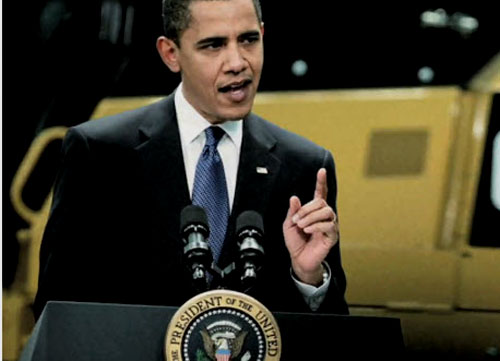
[HOME ] [ABOUT] [PHOTOS] [VIDEO] [BLOG] [HOUSTON] [TEXAS] [U.S. NEWS] [WORLD NEWS] [SPORTS] [POP CULTURE] [CONTACT]
Barack Obama resolves to veto any new Iran sanctions

by Joseph Earnest December 20, 2013
Newscast
Media WASHINGTON—The White House has vowed that President Barack Obama will veto any legislation imposing new U.S. sanctions on Iran.
The threat was issued December 19 after 26 senators – or more than
one-quarter of the Senate – introduced new Iranian sanctions
legislation.
The measure, backed by 13 Republicans and 13 Democrats would impose sanctions if the Islamic republic
violates the interim nuclear agreement with world powers reached in
November, or if no final long-term deal is reached to curb Iranian
nuclear activities.
Entitled the "Nuclear Weapon Free Iran Act," the proposed law would seek
to further restrict Iranian oil exports and target Iranian mining,
engineering, and construction industries.
It was not immediately clear when, or if, the measure will come to a
vote in Congress. Lawmakers are due to begin a holiday recess this week
until early 2014, and new Iranian sanctions are opposed by the Obama
administration and many in Congress.
White House spokesman Jay Carney called the bill unnecessary and
possibly harmful, saying it could undermine negotiations currently under
way with Iran.
Carney added that Washington could impose new sanctions quickly if the
international negotiations with Iran collapse. The spokesman said most
Americans support the current effort to reach a diplomatic settlement
with Tehran over the Iranian nuclear program.
The Senate legislation was introduced as experts from Iran and the six world powers resumed nuclear talks in Geneva.
In these discussions, experts are trying to determine the details of
lifting sanctions against Iran, and what specifically Iran must do to
demonstrate it is suspending parts of its nuclear program.
Under the November agreement, Iran stands to receive billions of dollars
worth of relief from Western economic sanctions. The sanctions are seen
has having crippled the Iranian economy, impacting millions of ordinary
Iranians, and forcing the reduction of Iranian oil exports, a key
revenue source.
In return for the sanctions relief, Iran has agreed to curb some nuclear
work, including limiting uranium enrichment to five percent purity --
well below the threshold needed to make a nuclear weapon -- and to
"neutralize" stockpiles of uranium that have been enriched to 20 percent
purity, or close to weapons-grade.
The agreement has been given a time-frame of six months to allow negotiators to craft a more permanent settlement.
Iran denies any effort to make a nuclear bomb, saying its atomic program is for power production and civilian uses only.
Earlier this month, Iran halted the international talks after the United
States blacklisted a further 19 companies and individuals under
existing sanctions. Tehran said the move was against the spirit of the
interim deal.
However, progress was reported during a December 9-12 meeting in Vienna
between Iran and representatives of the six powers—the United States,
Russia, China, Britain, France, and Germany. Add
Comments>>
Source: Radio Free Europe
|
|
Join the Newscast Media social networks
for current events and multimedia content.
Copyright© Newscast Media. All Rights Reserved. Terms and Privacy Policy
